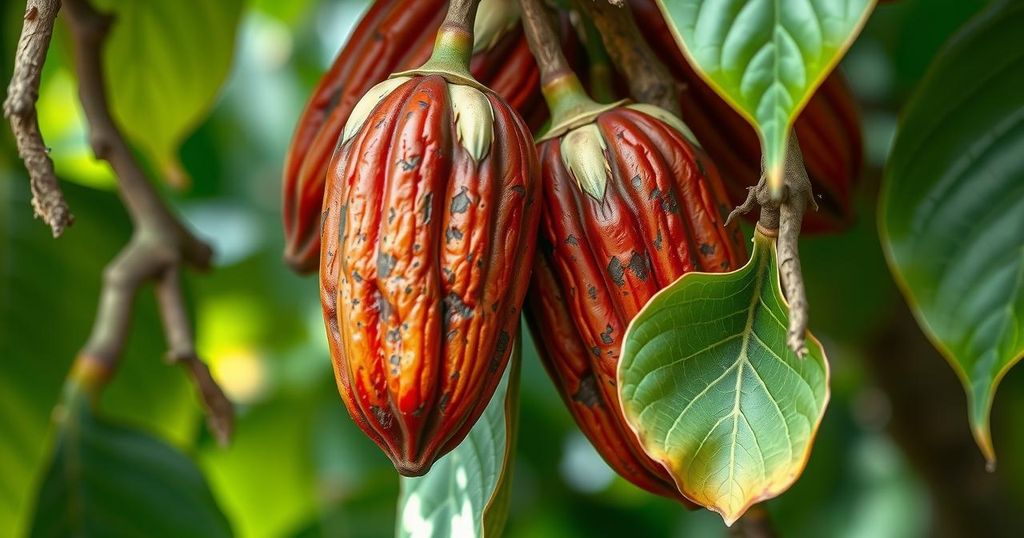Nigeria is working to enhance its cocoa production in response to soaring global prices, aiming to challenge major producers like Ivory Coast and Ghana. The government has set ambitious production targets while recognizing challenges such as market exposure and the needs of small-scale farmers. Regulatory efforts and sustainable practices will be crucial for long-term success.
Nigeria is endeavoring to enhance its presence in the cocoa industry as global cocoa prices have surged to record highs. With hopes to rival dominant producers such as Ivory Coast and Ghana, which have been affected by climate change and diseases, Nigeria sees potential in cocoa beans after prices reached $12,000 per tonne in December 2023. For farmers, these developments mark an unprecedented opportunity for profitability, according to Patrick Adebola of the Cocoa Research Institute of Nigeria.
In 2023, Nigeria ranked as the world’s seventh largest cocoa bean producer, harvesting over 280,000 tonnes, as per data from the UN’s Food and Agriculture Organization. The Nigerian government has set an ambitious goal of achieving a production target of 500,000 tonnes for the 2024-2025 season, which could elevate Nigeria’s standing to fourth place in global cocoa production.
While Adebola expresses skepticism about meeting the target this season, he notes that growing interest in rehabilitating and establishing cocoa plantations suggests Nigeria could reach this goal in the coming years. However, he highlights that Nigerian cocoa farmers are more vulnerable to the fluctuations of the global market compared to those in Ivory Coast and Ghana, where prices are controlled.
Despite the drop in cocoa futures contracts in New York from their December peak, prices remain substantial at over $8,000 per tonne, contrasting sharply with the previous range of $2,000 to $3,000. Comrade Adeola Adegoke, president of the Cocoa Farmers Association of Nigeria, indicated that enthusiasm for cocoa production is rising at all levels to capitalize on the favourable prices.
Ivory Coast continues to lead global production with over two million tonnes, followed by Ghana at 650,000 tonnes, both facing challenges due to adverse weather and diseases that have resulted in supply shortages. Although Nigeria’s cocoa production has not yet been severely affected by climate change, risks could arise from expanding the crop.
The Nigerian government has initiated efforts to regulate the cocoa sector through the National Cocoa Management Committee, established in 2022, aiming to enhance support for farmers. Modern agricultural initiatives have, however, sparked concerns regarding the rise of monocrop cocoa plantations, which prioritize cocoa cultivation over biodiversity.
Challenges remain, particularly as smallholder farmers dominate Nigeria’s cocoa landscape. Peter Okunde, a farmer from Ogun State, mentions the critical need for both land and financial resources for expansion. While Okunde emphasizes the necessity of land, John Alamu from Johnvents suggests that the area of land is not the principal issue, as Nigeria possesses ample land compared to Ghana. Rather, a comprehensive support strategy that includes provision of seedlings and agricultural training is essential to restore Nigeria’s position in the cocoa market.
In summary, Nigeria is poised to strengthen its cocoa industry amidst soaring global prices, aiming to rival top producers like Ivory Coast and Ghana. Despite ambitious production targets and rising local interest, challenges persist, including market exposure and the predominance of smallholder farmers. The government is addressing these challenges through regulatory frameworks, but sustainable practices are essential to ensure long-term success in cocoa cultivation. Comprehensive support for farmers and prudent management of resources will be key to revitalizing the sector.
Original Source: www.iosconews.com






